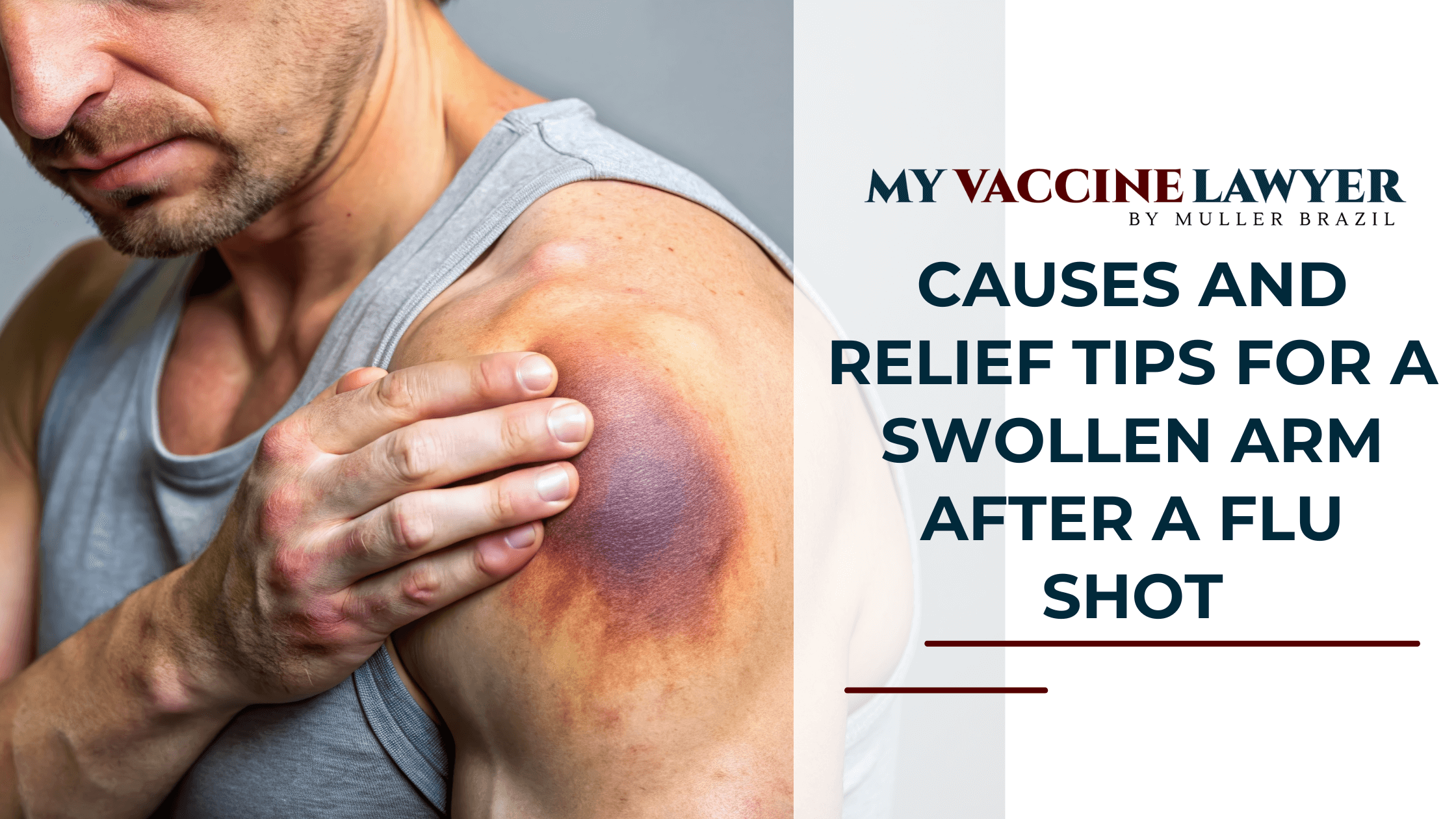Causes and Relief Tips for a Swollen Arm After a Flu Shot
Flu shots can cause arm swelling due to your body's immune response, but if the swelling worsens or persists, it may signal a more serious issue...
5 min read
Vaccine Injury Law Resources / Flu Shot / What to Avoid After a Flu Shot
 Max Muller
:
Sep 28, 2023 12:00:00 PM
Max Muller
:
Sep 28, 2023 12:00:00 PM
The flu shot is one of the best ways to protect yourself from the flu virus, but what happens after you get vaccinated matters, too. While most people experience only mild soreness or a slight fever, certain medications, activities, or underlying health conditions could affect how well the influenza vaccine works.
For the majority, flu shot side effects are temporary. But in some cases, people develop severe allergic reactions or complications that require immediate medical attention. If you’ve had lasting pain, unusual symptoms, or a serious reaction after your flu shot, it’s important to know what’s normal and when it might be time to speak with a healthcare provider or explore your legal options.
While most people recover quickly from the flu shot, certain medications, activities, or health conditions can affect how well it works. Knowing what to avoid after vaccination can help you manage side effects and recognize when to seek medical or legal help if something goes wrong.
Mild flu shot side effects are common as the immune system works overtime to develop antibodies. Most symptoms go away on their own within a few days, but it’s important to recognize when side effects are normal and when they might signal something more serious.
These are signs that the body is building immunity. Drinking plenty of fluids, applying a warm compress, and getting rest can help ease discomfort.
Some people experience flu-like symptoms, such as:
This does not mean the flu vaccine gave you the flu virus, the influenza vaccine contains inactive viruses that cannot cause infection.
While severe allergic reactions are rare, they require immediate medical attention. Watch for:
In certain cases, the flu shot has been linked to Guillain-Barré Syndrome (GBS), a condition that causes muscle weakness and paralysis. If you experience numbness, tingling, or weakness, contact a healthcare provider immediately.
Certain medications can interfere with how well the flu vaccine works, affecting your immune response and reducing the protective effects of the flu shot. Some may also worsen flu shot side effects, making recovery more difficult.
It may be tempting to take pain relievers like ibuprofen (Advil), naproxen (Aleve), or acetaminophen (Tylenol) to ease arm soreness or a slight fever, but research suggests they could impact the immune system’s response.
If you need relief, moderate exercise, a warm compress, or staying hydrated can help reduce pain naturally.
People taking steroid medications (such as prednisone) or immunosuppressive drugs should consult their healthcare provider before getting a flu vaccination. These medications can:
If you take biologic medications for autoimmune conditions or are undergoing chemotherapy, your immune response to the flu vaccine may not be as strong. Speak with your doctor’s office about the best timing for vaccination to maximize its effectiveness.
Most flu shot side effects are mild and go away within a few days, but there are ways to reduce discomfort and help your immune system recover.
Most people recover without issues, but seek medical attention if:
Yes, it’s possible to catch the flu virus even after getting a flu shot. The influenza vaccine helps protect against the most common strains, but no vaccine is 100% effective. It takes about two weeks for the body to develop antibodies, so if you were exposed to the flu virus shortly before or after vaccination, you may still get sick.
Even if you do get the flu, the flu vaccine can still provide protective effects by reducing the severity of symptoms and lowering the risk of severe illness or complications. People who are vaccinated tend to recover faster and are less likely to require hospitalization compared to those who are unvaccinated.
Some people mistake flu shot side effects for the flu itself. Symptoms like arm soreness, a slight fever, and muscle aches are signs that the immune system is building protection, not that the vaccine has caused an infection. The flu shot contains inactive viruses, meaning it cannot cause the flu. However, the nasal spray vaccine does contain weakened flu viruses and may cause mild flu-like symptoms in some people.
Most people recover quickly from a flu shot, but some should be extra cautious about side effects and how their immune system responds. Older adults, pregnant individuals, and those with chronic conditions may experience a weaker immune response, making it important to monitor symptoms closely.
People who should take extra precautions include:
For most, flu shot side effects are mild and temporary. But in rare cases, a reaction can lead to serious complications, such as Guillain-Barré Syndrome (GBS), severe allergic reactions, or long-term nerve damage. While symptoms like arm soreness, fatigue, and a slight fever are expected, persistent pain, unexplained weakness, or worsening symptoms may indicate something more serious.
The National Vaccine Injury Compensation Program (VICP) provides financial support for individuals who experience severe vaccine-related injuries. If side effects don’t resolve, worsen over time, or impact daily life, it may be important to understand your legal options and what steps to take next.
Take Control of Your Injury Today
Mr. Muller currently devotes the majority of his law practice to aggressively fighting for the victims of unsafe drug and medical device injuries, as well as vaccine injuries and vaccine reactions involving the flu shot, TDaP/DTaP vaccine, and more. He has handled hundreds of SIRVA injury cases (shoulder injury related to vaccine administration), especially those involving bursitis, tendonitis, frozen shoulder, and rotator cuff tears. Mr. Muller also handles cases where vaccines caused serious nerve injuries such as Guillain-Barre Syndrome. Mr. Muller has recovered millions of dollars in compensation for his clients in the Vaccine Injury Compensation Program.

Flu shots can cause arm swelling due to your body's immune response, but if the swelling worsens or persists, it may signal a more serious issue...

Yes, the flu shot is administered intramuscularly in most cases, typically in the deltoid muscle of the upper arm.

To relieve flu shot side effects, start by applying a cold compress to the injection site right after getting the shot to reduce pain and swelling....
